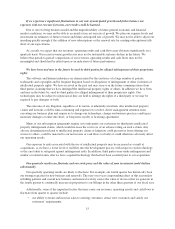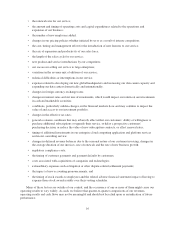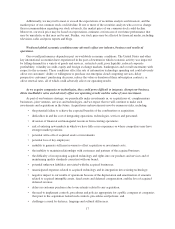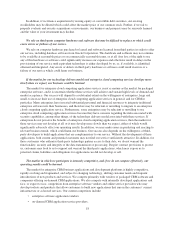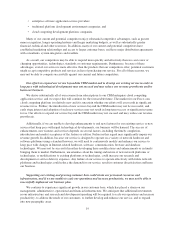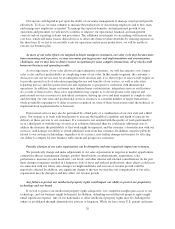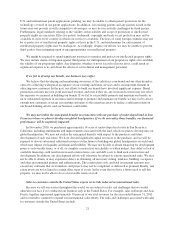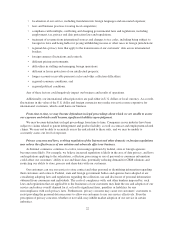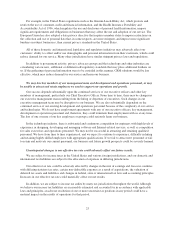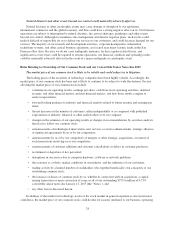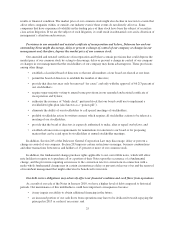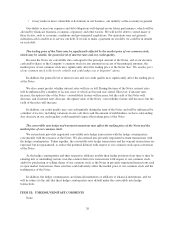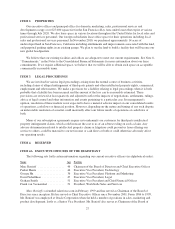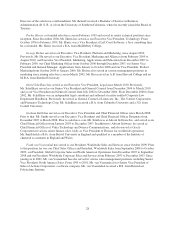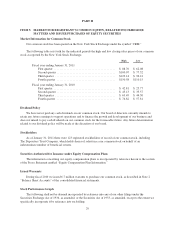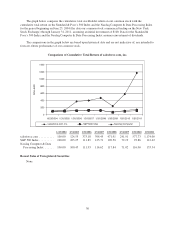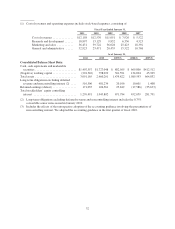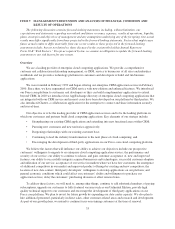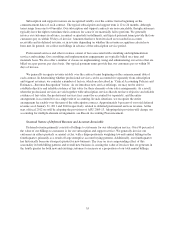Salesforce.com 2011 Annual Report Download - page 33
Download and view the complete annual report
Please find page 33 of the 2011 Salesforce.com annual report below. You can navigate through the pages in the report by either clicking on the pages listed below, or by using the keyword search tool below to find specific information within the annual report.results or financial condition. The market price of our common stock might also decline in reaction to events that
affect other companies within, or outside, our industry even if these events do not directly affect us. Some
companies that have experienced volatility in the trading price of their stock have been the subject of securities
class action litigation. If we are the subject of such litigation, it could result in substantial costs and a diversion of
management’s attention and resources.
Provisions in our amended and restated certificate of incorporation and bylaws, Delaware law and our
outstanding Notes might discourage, delay or prevent a change of control of our company or changes in our
management and, therefore, depress the market price of our common stock.
Our amended and restated certificate of incorporation and bylaws contain provisions that could depress the
market price of our common stock by acting to discourage, delay or prevent a change in control of our company
or changes in our management that the stockholders of our company may deem advantageous. These provisions
among other things:
• establish a classified board of directors so that not all members of our board are elected at one time;
• permit the board of directors to establish the number of directors;
• provide that directors may only be removed “for cause” and only with the approval of 66 2/3 percent of
our stockholders;
• require super-majority voting to amend some provisions in our amended and restated certificate of
incorporation and bylaws;
• authorize the issuance of “blank check” preferred stock that our board could use to implement a
stockholder rights plan (also known as a “poison pill”);
• eliminate the ability of our stockholders to call special meetings of stockholders;
• prohibit stockholder action by written consent, which requires all stockholder actions to be taken at a
meeting of our stockholders;
• provide that the board of directors is expressly authorized to make, alter or repeal our bylaws; and
• establish advance notice requirements for nominations for election to our board or for proposing
matters that can be acted upon by stockholders at annual stockholder meetings.
In addition, Section 203 of the Delaware General Corporation Law may discourage, delay or prevent a
change in control of our company. Section 203 imposes certain restrictions on merger, business combinations
and other transactions between us and holders of 15 percent or more of our common stock.
In addition, the fundamental change purchase rights applicable to our convertible notes, which will allow
note holders to require us to purchase all or a portion of their Notes upon the occurrence of a fundamental
change, and the provisions requiring an increase to the conversion rate for conversions in connection with a
make-whole fundamental change may in certain circumstances delay or prevent a takeover of us and the removal
of incumbent management that might otherwise be beneficial to investors.
Our debt service obligations may adversely affect our financial condition and cash flows from operations.
As a result of our sale of the Notes in January 2010, we have a higher level of debt compared to historical
periods. Our maintenance of this indebtedness could have important consequences because:
• it may impair our ability to obtain additional financing in the future;
• an increased portion of our cash flows from operations may have to be dedicated towards repaying the
principal in 2015 or earlier if necessary; and
25


